
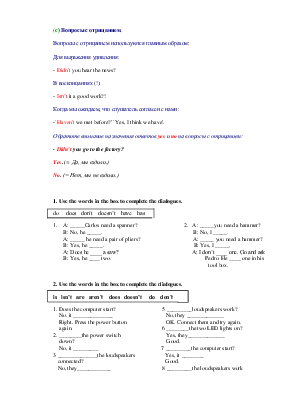
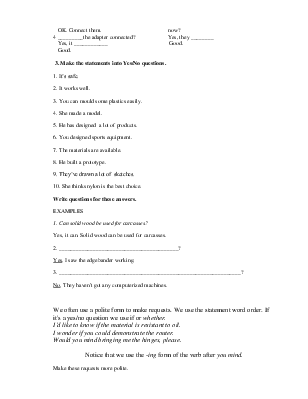
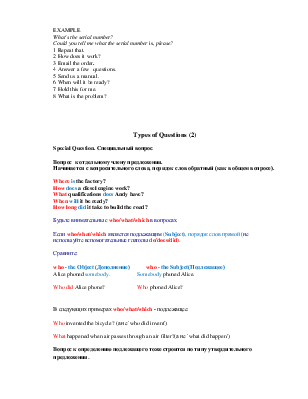
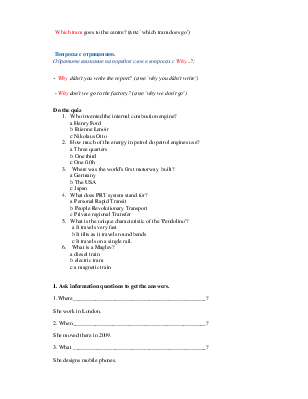
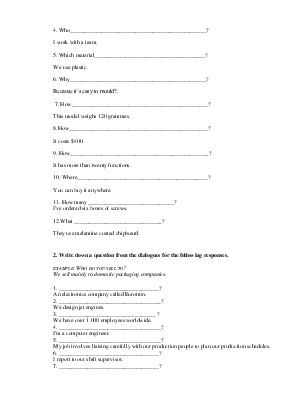
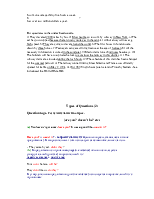
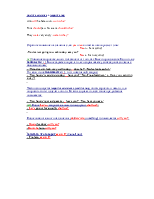
Types of Questions (1)
General Question. Общийвопрос.
Задается ко всему предложению в целом. Требует краткого ответа "Да" или "Нет" (Yes/No). Порядок слов обратный.
(a) Обычно вопросы конструируются изменением порядка слов:
мы помещаем вспомогательный глагол (auxiliary verb) (AV) перед подлежащим (subject)(S): Глагол to be во всех его формах сам является вспомогательным глаголом. Этим свойством также обладают модальные глаголы.
|
S + AV |
AV + S |
|
|
you are |
are you? |
Are you ready to start? |
|
he must |
must he? |
Must he go there? |
|
Fred will |
will Fred? |
Will Fred do this? |
I can see can I see? Can I see the new design?
this is is this? Is this a natural colour of the fabric?
(b) В вопросах в Present Simple используйте Do/Does:
|
S + AV |
AV + S |
|
|
you like |
do you like? |
Do you like reading? |
|
he works |
does he work? |
Does he work hard? |
В вопросах в Past Simple используйте Did:
|
S + AV |
AV + S |
|
|
you went |
did you go? |
Did you go there? |
|
He recorded |
did he record? |
Did he record the results? |
В вопросах в PresentPerfect используйте Have/Has:
S + AV AV + S
they have dug have they dug Have they dug tunnels?
he has built has he built Has he built a supporting wall?
В вопросах в PastPerfect используйте Had:
S + AV AV + S
they had carried out had they carried out? Had they carried out all the tests?
(с) Вопросы с отрицанием.
Вопросы с отрицанием используются главным образом:
Для выражения удивления:
- Didn't you hear the news?
В восклицаниях (!):
- Isn’t it a good work?!
Когда мы ожидаем, что слушатель согласен с нами:
-`Haven't we met before?' `Yes, I think we have'.
Обратите внимание на значения ответов yes и no на вопросы с отрицанием:
- Didn't you go to the factory?
Yes. (=Да, мы ездили.)
No. (= Нет, мы не ездили.)
![]()
![]()
![]() 1.
Use the words in the box to complete the dialogues.
1.
Use the words in the box to complete the dialogues.
![]() do
does don’t doesn’t have has
do
does don’t doesn’t have has
1. A: _____Carlos need a spanner? 2. A: _____you need a hammer?
B: No, he _____. B: No, I _____.
A: _____ he need a pair of pliers? A: _____ you need a hammer?
B: Yes, he _____. B: Yes, I _____.
A: Does he ____ a saw? A: I don’t ____ one. Go and ask
B: Yes, he ____ two. Pedro. He ____ one in his
tool box.
![]()
![]()
![]() 2.
Use the words in the box to complete the dialogues.
2.
Use the words in the box to complete the dialogues.
![]() is
isn’t are aren’t does doesn’t do don’t
is
isn’t are aren’t does doesn’t do don’t
1. Does the computer start? 5 _________loudspeakers work?
No. it ______________ No, they _____________
Right. Press the power button OK. Connect them and try again.
again. 6 ________the two LED lights on?
2. ________the power switch Yes, they_____________
down? Good.
No, it _________ 7 _________the computer start?
3 ______________the loudspeakers Yes, it ________
connected? Good.
No, they____________ 8 _________the loudspeakers work
OK. Connect them. now?
4 _________the adapter connected? Yes, they ________
Yes, it ____________ Good.
Good.
3. Make the statements into Yes/No questions.
1. It’s safe.
2. It works well.
3. You can mould some plastics easily.
4. She made a model.
5. He has designed a lot of products.
6. You designed sports equipment.
7. The materials are available.
8. He built a prototype.
9. They’ve drawn a lot of sketches.
10. She thinks nylon is the best choice.
Write questions for these answers.
EXAMPLES
1. Can solid wood be used for carcasses?
Yes, it can. Solid wood can be used for carcasses.
2. __________________________________________?
Yes. I saw the edgebander working.
3. ________________________________________________________________?
No. They haven't got any computerized machines.
We often use a polite form to make requests. We use the statement word order. If it's a yes/no question we use if or whether.
I'd like to know if the material is resistant to oil.
I wonderif you could demonstrate the router.
Would you mind bringing me the hinges, please.
Notice that we use the -ing form of the verb after you mind.
Make these requests more polite.
EXAMPLE
What's the serial number?
Could you tell me what the serial number is, please?
1 Repeat that.
2 How does it work?
3 Email the order.
4 Answer a few questions.
5 Send us a manual.
6 When will it be ready?
7 Hold this for me.
8 What is the problem?
Types of Questions (2)
Special Question. Специальныйвопрос.
Вопрос к отдельному члену предложения.
Начинается с вопросительного слова, порядок слов обратный (как в общем вопросе).
Where is the factory?
How does a diesel engine work?
What qualifications does Andy have?
When will it be ready?
How long did it take to build the road?
Будьте внимательны с who/what/which в вопросах.
Если who/what/which является подлежащим (Subject), порядок слов прямой (не используйте вспомогательные глаголы do/does/did).
Сравните:
|
who - the Object (Дополнение) |
who - the Subject(Подлежащее) |
|
Alice phoned somebody. Who did Alice phone? |
Somebody phoned Alice. Who phoned Alice? |
В следующих примерах who/what/which - подлежащее:
Who invented the bicycle? (а не `who did invent')
What happened when air passes through an air filter?(а не `what did happen')
Вопрос к определению подлежащего тоже строится по типу утвердительного предложения.
Which tram goes to the centre? (а не `which tram does go')
Вопросы с отрицанием.
Обратите внимание на порядок слов в вопросах сWhy...?:
- Whydidn't you write the report? (ане `why you didn't write')
- Why don't we go to the factory? (ане `why we don't go')
Do the quiz
1. Who invented the internal combustion engine?
a Henry Ford
b Etienne Lenoir с Nikolaus Otto
2. How much of the energy in petrol do petrol engines use?
a Three quarters
b One third с One fifth
3. Where was the world's first motorway built?
a Germany
b The USA с Japan
4. What does PRT system stand for?
a Personal Rapid Transit
b People Revolutionary Transport
c Private regional Transfer
5. What is the unique characteristic of the 'Pendolino'?
a It travels very fast
b It tilts as it travels round bends
с It travels on a single rail.
6. What is a Maglev?
a diesel train
belectric tram с a magnetic train
1. Ask information questions to get the answers.
1.Where_______________________________________________?
She work in London.
2. When_______________________________________________?
She moved there in 2009.
3. What _______________________________________________?
She designs mobile phones.
4. Who________________________________________________?
I work with a team.
5. Which material_______________________________________?
We use plastic.
6. Why________________________________________________?
Because it’s easy to mould?.
7. How________________________________________________?
This model weighs 120 grammes.
8.How_________________________________________________?
It costs $400.
9. How_________________________________________________?
It has more than twenty functions.
10. Where______________________________________________?
You can buy it anywhere.
11. How many ______________________________?
I've ordered six boxes of screws.
12.What _______________________________?
They use melamine coated chipboard.
2. Write down a question from the dialogues for the following responses.
example: Who do you sell to?
We sell mainly to domestic packaging companies.
1. ___________________________________?
An electronics company called Eurotron.
2. ____________________________________?
We design jet engines.
3. __________________________________ ?
We have over 1 000 employees worldwide.
4. ____________________________________?
I'm a computer engineer.
5. ____________________________________?
My job involves liaising carefully with our production people to plan our production schedules.
6. ___________________________________?
I report to our shift supervisor.
7. ___________________________________?
I work on average thirty-five hours a week.
8. ___________________________________?
Just over two million dollars a year.
Put questions to the underlined words.
1) They traveled 2.000 miles by bus. 2) Most people go to work by subway in New York. 3) The car has just stopped because there isn't any more gas in the tank. 4) Arthur always drives at a high speed. 5) They are going to travel around the world. 6) The first buses in London were drawn by three horses. 7) Teenagers can get a driving license at the age of fourteen. 8) All the necessary information is stored in the computer. 9) Metro trains run at 8 minutes headways. 10) The builders will have to explode the rock to construct the railway in this district. 11) The subway trains are crowded during the rush hours.12) The schedule of this train has been changed for the summer period. 13) The railway tunnel linking Great Britain and France was officially opened for traffic on May 7. 1994. 14) In 1989. English computer scientist Timothy Berners-Lee introduced the World Wide Web
Types of Questions (2)
Question tags. Разделительный вопрос.
(are you? doesn't he? etc.)
(a) You haven't got a car, have you? It was a good film, wasn't it?
Haveyou? и wasn'tit? - вопросительные тэги (мини-вопросы, ставящиеся в конце предложения). В вопросительных тэгах используются вспомогательные глаголы.
- They came by car, didn't they?
(b) В предложении с отрицанием (negative sentence) обычно используется утвердительный (positive) вопросительный тэг:
|
negative sentence + positive tag Tom won't be late, will he? They don't like us, do they? |
В утвердительном предложении (positive sentence) используется вопросительный тэг с отрицанием:
|
positive sentence + negative tag Ann will be here soon, won't she? Tom should pass his exam, shouldn't he? They were very angry, weren't they? |
Обратите внимание на значения слов yes и no в ответах на вопросы с тэгом:
|
Yes. (= I am going) |
|
|
- You're not going to work today, are you? |
|
|
No. (= I'm not going) |
(c) Значение вопросительного тэга зависит от того, как Вы его произносите. Если голос понижается (_),Вы не задаете вопрос, а только спрашиваете у собеседника согласия с вашим мнением:
- `Tom doesn't look very well today, _ does he?' `No, helooksawful.'
Но если голос повышается (_), то это настоящий вопрос:
- `You haven't seen Ann today, _ have you?' `No, I'm afraid not.' (= Have you seen Ann today?)
Часто используется negativesentence + positivetag, чтобы спросить о чем-то, или попросить кого-то сделать что-то. В таких случаях голос в конце предложения повышается:
- `Youhaven'tgotacigarette, _ haveyou?' `Yes, here
Уважаемый посетитель!
Чтобы распечатать файл, скачайте его (в формате Word).
Ссылка на скачивание - внизу страницы.